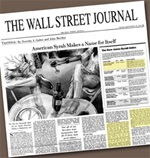Pak economy is weakening amid internal strife: WSJ
New York, Feb 6:  Pakistan’s economy is weakening amid the internal strife in the country, The Wall Street Journal (WSJ) has said in its report.
Pakistan’s economy is weakening amid the internal strife in the country, The Wall Street Journal (WSJ) has said in its report.
"Anaemic textile exports, rising food prices and energy shortages have undercut growth, causing the government to miss a range of economic targets, the WSJ said.
"Last month the government said growth would fall below its original target of 7.2 per cent for the fiscal year ending June 30," it added.
After spasms of violence that followed the assassination of PPP leader Benazir Bhutto, and the approach of national elections on February 18 that held the potential for more unrest, the Journal quoted analysts as saying that the economy could slacken further.
Rioters caused an estimated 1.3 billion dollars in losses, according to Karachi Chamber of Commerce. Power transmission, telecommunications and roads were affected, the WSJ said.
The paper said that President Pervez Musharraf has been counting on a robust economy to ride out the country’s political shocks.
For five years, Pakistan has grown on an average of seven per cent annually, with the US providing nearly 11 billion dollars in assistance since the September 11, 2001 attacks.
The WSJ quoted Finance Minister Salman Shah as saying that economic fundamentals remained strong and growth should still exceed 6 per cent, which would outstrip many of Pakistan’s peers in Asia.
But the WSJ report cited Musharraf’s opponents as saying that the economy now held huge political hazards because inflation and slower job growth had increased public discontent, especially among the poor.
"He’s giving the next government a highly unstable economic scenario," said PPP spokesperson Sherry Rehman.
Rising prices for food staples have spurred inflation, with the benchmark inflation rate staying above 8 per cent for the second straight month in December and breeching a government target of 7.5 per cent, the paper said.
Inflation has sapped exports, which declined 12 per cent in December from a year earlier, it added.
The WSJ pointed out that the State Bank said in a recent report that Pakistan risked missing its target of containing its fiscal deficit to four per cent of gross domestic product partly because the militancy had spurred heavy defence spending, the Dawn reported. (ANI)